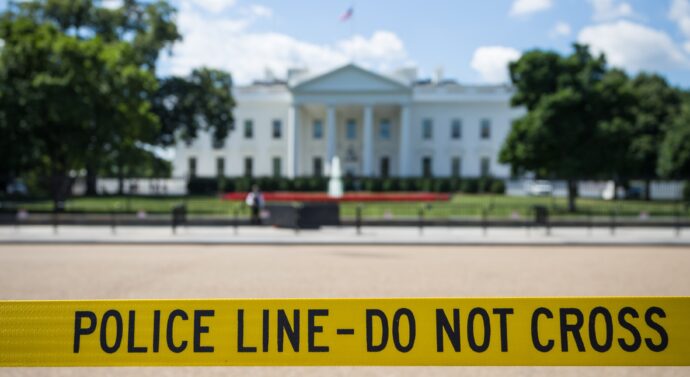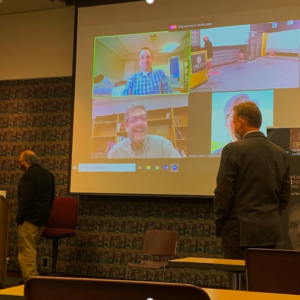
Still indivisible? Drury faculty reflects on the state of American government
Community, News February 15, 2021, Comments Off 127Suggested by Drury President Tim Cloyd and provost Beth Harville, the Still Indivisible panel was coordinated by Dr. Daniel Ponder through the Meador Center. Mike Brothers, executive director of public relations, fielded questions submitted online.
The panel ran from 5:30 to approximately 7:00 in Reed Auditorium. It was livestreamed as well. Surveying the sparse in-person attendance, Ponder noted he was “grateful but surprised” anyone had chosen to physically attend at all.
The panelists included:
- Greg Booker, Associate Professor of Communication
- Jonathan Groves, Communication Department Chair
- Jennifer Joslin, Compass Center director
- Justin Leinaweaver, Assistant Professor of Political Science
- ·Janis Prewitt, Professor of Management and attorney at law
- Jeff Vandenberg, Professor of Political Science
- Michael Verney, Assistant Professor of History

From the panel. Dr. Daniel Ponder (left) and Dr. Jeff Vandenberg (right). On screen from the top left: Dr. Justin Leinaweaver, Dr. Jonathan Groves, and Compass Center director Jennifer Joslin·
Originally intended to discuss pre-submitted questions, the in-person attendees offered the majority of comments throughout the night for the panelists to answer. The discussion was productive, provocative and civil. Its central themes and recurring topics are presented below.
The role of social media
Social media and its lack of information verification were noted as a critical issue in maintaining democracy. During the election, platforms like Facebook and Twitter finally took a stand against misinformation. Banners reminded users that there was no substantial evidence of election fraud, and notifications alerted viewers if a post included unverified or false information. However, such action needs to be consistent.
Misinformation are false or inaccurate claims shared without the intent to deceive an audience. Disinformation purposefully tries to mislead its recipients. Both are increasingly prevalent on social media.
“[The] algorithms reward things that get traction,” Groves said.
Regardless of a tweet’s context or content, including a trending name or topic is all the algorithm looks for.
Groves emphasized reading through and fact-checking articles before sharing them on social media to avoid falling prey to misleading or clickbait headlines.
In the early days of television, there were limited channels that broadcasted to the nation at large. Today, there is “narrowcasting” – there are channels and platforms that target niches of interests and beliefs, making it harder to glean the facts from opinions and, more recently, fiction.
Booker added that AM talk radio provides a community of like-minded conservative individuals. He broadened his statement to iterate the dangers of residing in an echo chamber for one’s own beliefs.
The Capitol insurrection and extremism
Jan. 6 marked a failure of a peaceful transition of power as rioters stormed the Capitol following former President Trump’s “Save America” rally on the National Mall.
“Democracy, both as a concept and as an empirically identifiable form of government, is complex,” Ponder said.
Conversation tensed halfway through the event as political extremism moved to the forefront of the questions. 2019 was the fourteenth year of global democratic decline, according to Freedom House. Global trends indicate increasing authoritarianism and right-wing parties on the rise. President Cloyd referenced an article from The Atlantic, which looked at 193 individuals arrested at the Capitol on Jan. 6. This initial study argued that the insurrectionists had fewer outright ties to far-right organizations and militias than one might assume. The authors found that the majority of the 193 surveyed were middle class and held white-collar jobs.
Panelists and attendees alike contested equating extremism on the right and the left. Leinaweaver noted that right-wing extremism was rooted in hate and anti-civil rights actions and that violence from “Antifa,” the shorthand for “anti-fascist,” was almost solely a media narrative. A student also challenged Cloyd’s comparison of the 1966 Black Panther Party to the Capitol riot as a false equivalency.
While discussing the liberty of marginalized groups, Joslin pointed out that not everyone in the U.S. receives the same liberties. People of color and members of the LGBTQ+ community continue to face discrimination, presenting a different view of the “self-evident” American rights.
“Fundamental rules” for the path forward
The panel emphasized that there are no simple solutions to complex problems. People do not need to agree on the ins and outs of policy, but a baseline needs to be established.
The role of government is an issue in both parties. Ponder stated that big and small government had its merits in various aspects for Republicans and Democrats.
“We don’t have to agree on policy. We need much more fundamental rules,” Vandenberg said.
“We need to get to a point where we stop vilifying the other side. When you tell people that ‘those people are un-American, those people hate America, those people hate God, and those people are evil and they’re out to destroy you… but we’re going to compromise with them. We’ll work together’ – it doesn’t work,” Booker said.
“They will get primaried… at their next election if these people are so horrible and [they] start to work with them. Stop completely villainizing the other side. We used to be able to do that,” he concluded.
Lessons learned in 2020
“Because of Google, we know everything,” said Groves. “All of a sudden, I’m getting this false confidence that I can do anything with the Internet, including solving all the problems in our country.”
“We don’t have the patience for the nuance and the complexity anymore,” Groves continued.
“Our institutions and our guardrails are there, but they are not self-executing,” Ponder said.
Vandenberg took a hopeful stance toward the democratic issues of 2020.
“Voter turnout was incredible in the election. Young people’s voter turnout was seven, eight, nine percent higher… There’s representation that’s happening in government,” he pointed out. “I don’t want us to lose sight of that. In terms of the resiliency of democracy. There were a lot of stress tests, but there were Republican leaders in Congress that said no. [They] stood up and said democracy’s more important than party.”
The panel closed with a rebuttal – are those actually heartening things? How many more stress tests can the U.S. endure? There are no simple fixes, but determining what cannot be tolerated in the political arena is a step toward unity with accountability.
Article and panel photo by Maclen Johnson